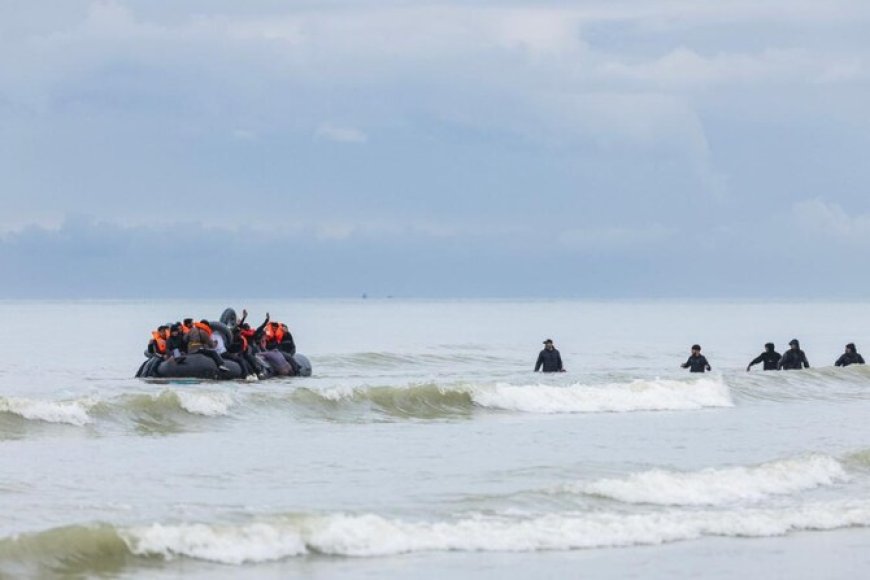The dark reality of people smuggling networks and the UK's role in combating it
The chilling reminder of the dark underworld of human trafficking and exploitation that continues to plague Europe is underscored by the recent arrest of three Afghan men in the UK, who were convicted for their roles in a gruesome people smuggling conspiracy.

The chilling reminder of the dark underworld of human trafficking and exploitation that continues to plague Europe is underscored by the recent arrest of three Afghan men in the UK, who were convicted for their roles in a gruesome people smuggling conspiracy. These men, who were a part of a larger gang, were convicted of organizing perilous journeys for migrants who were escaping conflict and poverty in Afghanistan. They were subjected to additional horrors during the journey. The gang's activities, which encompass smuggling individuals through perilous routes and sexual assaults on vulnerable juveniles, highlight the severity of the crisis that is currently confronting both the migrants and the governments that are attempting to address this rising threat.
The complex and increasingly transnational character of human trafficking networks is exemplified by the investigation that resulted in these arrests by the UK's National Crime Agency (NCA) and Belgian authorities. The gang transported migrants from Afghanistan to France and Belgium by traveling through Iran, Turkey, and the Balkans. The final phase of the journey for many involved the crossing of the Channel in overcrowded and unsafe small boats, a route that has tragically claimed many lives over the years.
The gang's actions were not only exploitative but also grotesque, as they subjected male migrant juveniles to horrific sexual assaults, including rape. They filmed these heinous acts in order to blackmail their victims. The severe risks that vulnerable migrants encounter and the moral decay of the traffickers who profit from their suffering are underscored by these violations, which are perpetrated under the guise of human smuggling operations.
The men who were apprehended—Ziarmal Khan, 24, Zeeshan Banghis, 20, and Saifur Rahman Ahmedzai, 23—were tried in Belgium while they were absent and subsequently sentenced to a combined total of 170 years in prison. These convictions are part of a broader initiative to dismantle the intricate criminal networks that operate across multiple borders, exploiting destitute individuals for financial gain. However, these arrests are not only a positive development, but they also serve as a stark reminder of the international community's inadequacies in its response to people smuggling and the violence that frequently accompanies it.
The issue of people smuggling is still far from resolved, despite the arrests and convictions. In 2024, the United Kingdom, a significant destination for migrants crossing the Channel, experienced a significant increase in the number of individuals who made the perilous voyage, with more than 37,100 individuals doing so. It is a tragedy that 76 lives have been lost in the process. After migration became a central issue in the July general elections, the recent surge in crossings has dominated British political discourse, assisting Prime Minister Keir Starmer and his Labour Party in their ascension to power. The UK government has responded by establishing new agreements with countries such as Germany and Iraq, in order to address the escalating smuggling threat.
Nevertheless, the query remains: Is the United Kingdom, as well as the broader European Union, taking sufficient measures to prevent the networks that facilitate these perilous journeys? The arrest of these three individuals, while successful, only scratches the surface of the global issue at hand. In the pursuit of a better life, individuals continue to take on all risks, including the risk of mortality, violence, and dangerous smuggling routes. However, the systems that enable this exploitation to thrive remain largely unaffected, even if these traffickers are apprehended. The gang's capacity to operate throughout international borders with impunity underscores the necessity for more robust, coordinated international action.
The human toll of these crimes is significantly higher than the statistics that frequently dominate the news. Each number is associated with an individual who has a narrative. These individuals have fled violence, conflict, or oppression, only to be met with additional suffering. The UK's recent initiatives to combat people smuggling through agreements and law enforcement may be positive strides; however, they will be successful only if they are complemented by a genuine dedication to dismantling the criminal networks that exploit vulnerable migrants and increased support for them.
The lamentable cycle of human trafficking and suffering will persist until governments prioritize long-term solutions over short-term political gains. It is imperative that the international community take action to prevent the conditions that contribute to people smuggling, rather than merely apprehending perpetrators. This entails addressing the underlying causes of migration, providing legal options for asylum seekers, and ensuring that the journey of those fleeing conflict and persecution does not result in additional danger. The fight against people smuggling is not solely about the conviction of perpetrators; it is also about preventing the loss of any additional lives from the process.













































